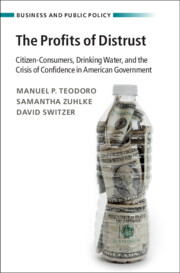 The Profits of Distrust
The Profits of Distrust Moral Trust, Voice, and Exit
Published online by Cambridge University Press: 18 August 2022
This chapter examines the relationship between moral trust in government and the choice of citizen-consumers to exercise voice and exit. We find that when faced with tap water failure, ethnic and racial minorities are less likely to voice their concerns to utilities due to their historical marginalization in the United States. This disparity in the likelihood of exercising voice is most prevalent among poor populations, with the effect especially pronounced among Hispanics. Further, we find that citizen-consumers who lack moral trust in government are more likely to consume bottled water, signifying exit from publicly provided services. Exit from public services has downstream political effects. Citizen-consumers who drink bottled water are less likely to engage in politics. As bottled water consumption increases, voting rates decrease. The consequences of declining trust in government and the turn away from public services strikes at the heart of democracy itself. When individuals do not trust government to provide basic services, there is little reason for them to engage in public life more broadly.
To save this book to your Kindle, first ensure [email protected] is added to your Approved Personal Document E-mail List under your Personal Document Settings on the Manage Your Content and Devices page of your Amazon account. Then enter the ‘name’ part of your Kindle email address below. Find out more about saving to your Kindle.
Note you can select to save to either the @free.kindle.com or @kindle.com variations. ‘@free.kindle.com’ emails are free but can only be saved to your device when it is connected to wi-fi. ‘@kindle.com’ emails can be delivered even when you are not connected to wi-fi, but note that service fees apply.
Find out more about the Kindle Personal Document Service.
To save content items to your account, please confirm that you agree to abide by our usage policies. If this is the first time you use this feature, you will be asked to authorise Cambridge Core to connect with your account. Find out more about saving content to Dropbox.
To save content items to your account, please confirm that you agree to abide by our usage policies. If this is the first time you use this feature, you will be asked to authorise Cambridge Core to connect with your account. Find out more about saving content to Google Drive.